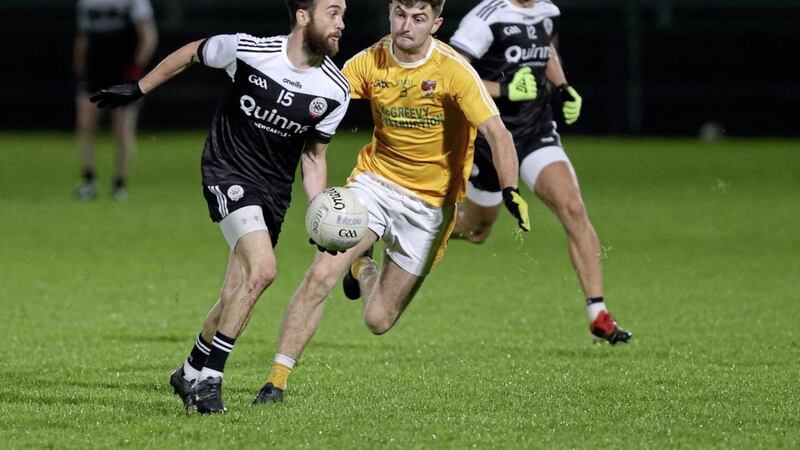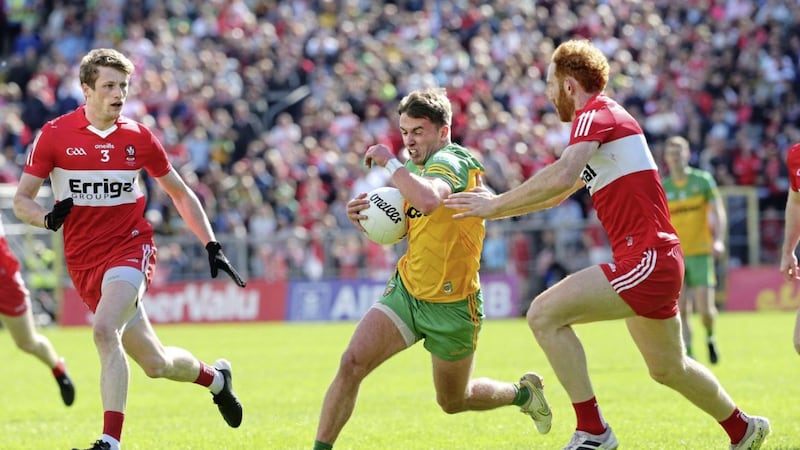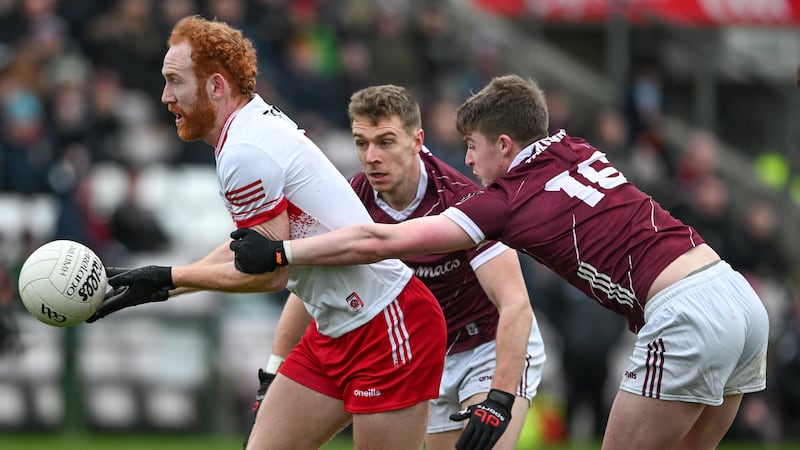WHEN he was 16, Conor Laverty managed Kilcoo’s under-12s along with Gary McEvoy. In the days before Go Games, they won the county title. Among that team were Paul Devlin and Aaron Branagan.
It’s not completely unheard of for an underage player to have managed an underage team in a rural club like Kilcoo, but you wouldn’t hear of them winning too often.
Between playing at his own age group and then sitting at the front of the bus with the under-12s, it was a busy teenage life.
The most of two decades has passed, but little has changed.
Laverty will captain his club in the Ulster senior final next Sunday, and then the following weekend he’ll be on the line sending out the minors for their first round provincial tie against Killyclogher up at St Paul’s.
While he’s officially in the job, his work as Monaghan’s coach won’t require much of his attention until they’re hitting the pitch.
The day job, which the 34-year-old has now been in for nine years, involves overseeing the entire stable of GAA teams at Trinity College in Dublin.
Sitting right on the banks of the Liffey, they’re sandwiched between the sporting superpowers of DCU and UCD.
“I’m full-time there but it’s flexible if you have to go to a match in the morning. I’ve to go to Dublin to matches some evenings, or maybe stay down an odd night for a game in the morning.
“I’m over all the GAA clubs, the hurling, football, camogie, ladies’ football and handball.
“It’s an enjoyable place and the people are very good. They’re making good strides in trying to get to that top table – it’s very difficult with so many other colleges, but we are putting good structures in place.”
The spirit of a coach has always resided in him. Between his days playing with Down and Kilcoo, he’s tried to glean whatever he can off whomever he can.
So what makes a good coach?
“Adaptability, especially in the modern game. Being able to adapt to different scenarios. And being a good players’ man. Having the players love you and believe in you.
“I’ve been very lucky to have worked with some great managers, learnt a lot of things from a lot of different men. That’s the summary I’ve come up with. Make sure the players love you and enjoy playing for you, and half the battle’s won.”
It’s one thing to be able to see what should happen on a football field, and another thing entirely to be able to communicate how to do it.
A lot of the traits that Conor Laverty has as a player are so instinctive that they are almost uncoachable.
Two instances in the semi-final win over Derrygonnelly that laid his repertoire out in its Sunday best.
The obvious one was the Kilcoo goal. As Ryan Johnston is fouled, Laverty’s standing five yards behind him. As his team-mate hits the ground, Laverty takes a quick glance inside. Sees no sweeper, and off he goes to get the ball.
Anthony Morgan knows what’s in his locker and sets off down the middle. Laverty drops the ball into his chest. The goal is simple from there.
The second instance was a breaking ball in the second half. The ball’s hanging up well away from him but Laverty recognises not only the lack of black and white shirts around it, but where it’s likely to fall. Like a swooping eagle, he’s in and out of the gap in two seconds, ball in hand.
For him, the greatest principle is not to stunt natural ability for favour of the system.
“I think all players should have the ability to play with that freedom, to play it as they see it on the field. You can have all the systems and gameplans in place, but when that ball is thrown in, games can go any way.
“Players should have that ability to play what they see.”
Kilcoo’s return to a third provincial final since 2012 – when it was Gary McEvoy that captained them – comes as no real surprise.
Hiring Mickey Moran, who brought Conleith Gilligan and Paul Devlin up the road from south Derry with him, was a notable statement of intent.
“He’s possibly one of the nicest men I’ve ever come across in GAA circles. He’s just a pleasure to play for. He instils great belief in his players, he’s very approachable. Just a gentleman,” says Laverty.
The same gentleman who put the barrier up on Kilcoo’s dream twice while he managed Slaughtneil.
Whether the similarity between the Emmet’s and Eoghan Rua is part of what attracted Moran to the Mournes, only he knows.
Both small, tight-knit rural communities with very little going on in them except football. And perhaps the fact that it was looking in a mirror was part of why Kilcoo couldn’t get over Slaughtneil in 2015 or 2016.
Naomh Conaill are a larger entity, coming from a big sprawling parish in west Donegal.
When Kilcoo lost their Down title last year, it was said that their chance of an Ulster title had gone. They’d been on the scene since 2012 and couldn’t get over the line, and there are only so many openings you’ll get before the door shuts.
“I don’t agree with that at all,” argues Laverty, intently poring over each word in the upstairs bar in Omagh’s clubhouse.
“This is a very young Kilcoo team, a team that’s getting better each year. There are young lads have come on to our panel this year and brought us to a different level.
“In the foreseeable future there’ll be a lot of players moving on but these young boys will step in, as they have done already, and take Kilcoo on, striving to be successful.”
Naomh Conaill have had similar barbs thrown at them. Half of their team next weekend played in the Ulster final against Crossmaglen nine years ago, and they’d lost back-to-back Donegal finals before winning this year.
Laverty isn’t drawn on whether the embers of his own fire are going grey.
Juggling Trinity, Monaghan and Kilcoo might be a big ask for the father of four boys, but Conor Laverty’s never known anything other than busy, nor anything other than football.
“Football’s life, that’s the bottom line. Should it be playing or coaching or even going out supporting, whatever it is, football’s life.
“Nothing compares to playing with Kilcoo. No matter what, nothing will ever compare to it.”








